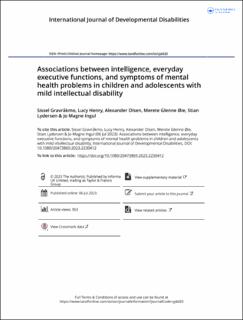| dc.contributor.author | Gravråkmo, Sissel | |
| dc.contributor.author | Henry, Lucy | |
| dc.contributor.author | Olsen, Alexander | |
| dc.contributor.author | Øie, Merete Glenne | |
| dc.contributor.author | Lydersen, Stian | |
| dc.contributor.author | Ingul, Jo Magne | |
| dc.date.accessioned | 2024-01-25T11:58:10Z | |
| dc.date.available | 2024-01-25T11:58:10Z | |
| dc.date.created | 2023-08-04T15:26:35Z | |
| dc.date.issued | 2023 | |
| dc.identifier.citation | International Journal of Developmental Disabilities (IJDD). 2023, . | en_US |
| dc.identifier.issn | 2047-3869 | |
| dc.identifier.uri | https://hdl.handle.net/11250/3113811 | |
| dc.description.abstract | Background: Children and adolescents with intellectual disabilities have been found to have a higher prevalence of symptoms of mental health problems than the general population, but it is unclear whether these challenges are related to intelligence. The aim of this study was to explore the associations among symptoms of mental health problems, everyday executive functions and intelligence in this group.
Methods: Forty children and adolescents, pre-diagnosed with mild intellectual disability, were assessed for symptoms of mental health problems, intelligence, and everyday executive functions. The associations were explored using linear regression analyses.
Results: Symptoms of mental health problems were associated with everyday executive functions but not with intelligence. The prevalence of mental health problems within the group was three to four times higher than what is typically observed in the general population.
Conclusion: Although a remarkably high prevalence of symptoms of mental health problems was found among children and adolescents with pre-diagnosed mild intellectual disability, no relationship to intelligence was discovered in this population. Instead, a relationship between everyday executive functions and symptoms of mental health problems was found. Assessing everyday executive functions in children and adolescents with mild intellectual disability can provide valuable information about what support should be provided to prevent mental health problems in this population. | en_US |
| dc.language.iso | eng | en_US |
| dc.publisher | Taylor & Francis | en_US |
| dc.relation.uri | https://doi.org/10.1080/20473869.2023.2230412 | |
| dc.rights | Navngivelse 4.0 Internasjonal | * |
| dc.rights.uri | http://creativecommons.org/licenses/by/4.0/deed.no | * |
| dc.subject | Utviklingsforstyrrelser | en_US |
| dc.subject | Developing disorder | en_US |
| dc.subject | Mental helse | en_US |
| dc.subject | Mental Health | en_US |
| dc.subject | Psykisk utviklingshemming | en_US |
| dc.subject | Mental retardation | en_US |
| dc.subject | Eksekutive funksjoner | en_US |
| dc.subject | Executive functions | en_US |
| dc.title | Associations between intelligence, everyday executive functions, and symptoms of mental health problems in children and adolescents with mild intellectual disability | en_US |
| dc.title.alternative | Associations between intelligence, everyday executive functions, and symptoms of mental health problems in children and adolescents with mild intellectual disability | en_US |
| dc.type | Peer reviewed | en_US |
| dc.type | Journal article | en_US |
| dc.description.version | publishedVersion | en_US |
| dc.subject.nsi | VDP::Klinisk psykologi: 262 | en_US |
| dc.subject.nsi | VDP::Clinical psychology: 262 | en_US |
| dc.source.pagenumber | 10 | en_US |
| dc.source.journal | International Journal of Developmental Disabilities (IJDD) | en_US |
| dc.identifier.doi | 10.1080/20473869.2023.2230412 | |
| dc.identifier.cristin | 2164932 | |
| dc.relation.project | Norges forskningsråd: 328615 | en_US |
| cristin.ispublished | true | |
| cristin.fulltext | original | |
| cristin.qualitycode | 1 | |

